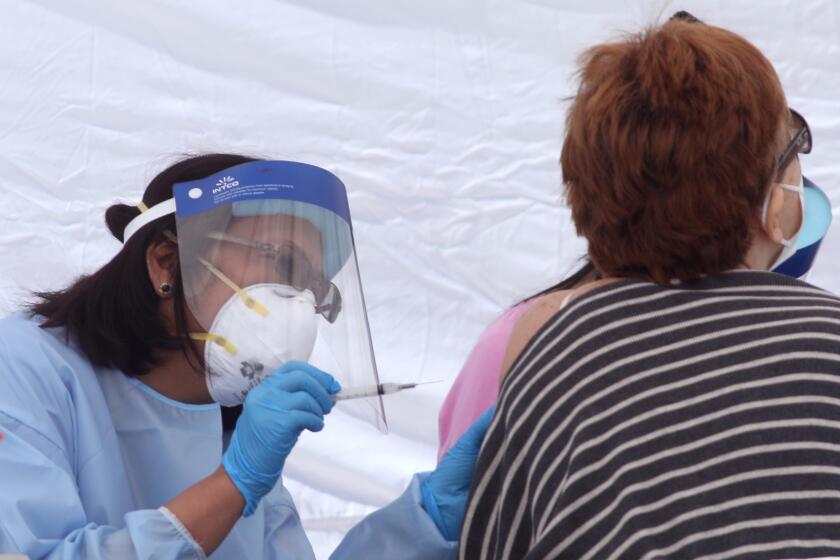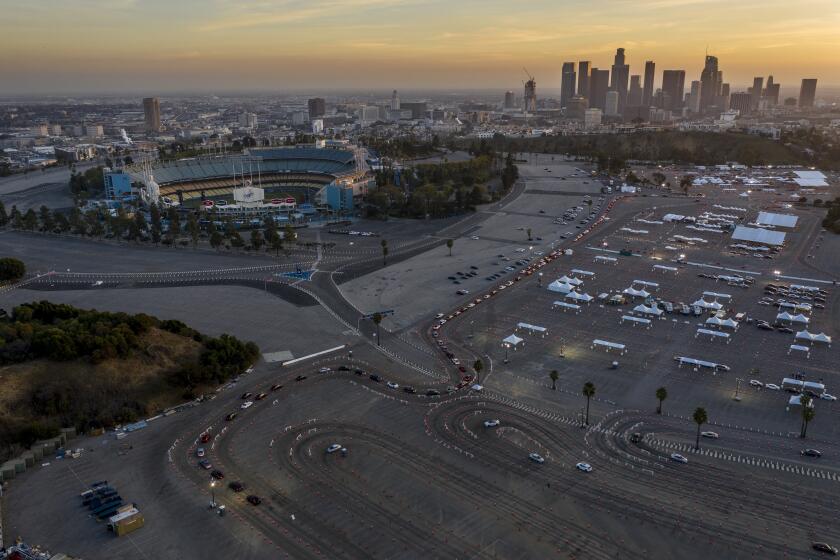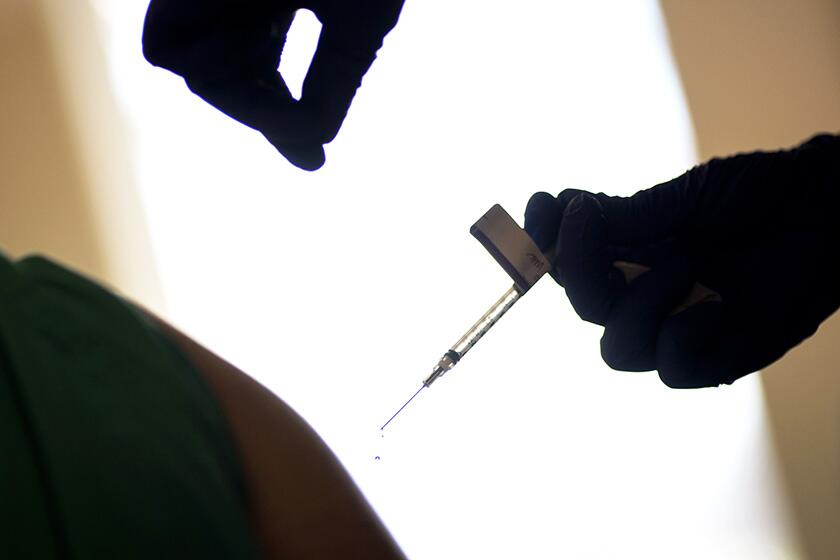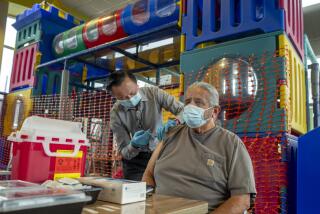As COVID-19 vaccine eligibility is set to be expanded, many seniors are still waiting
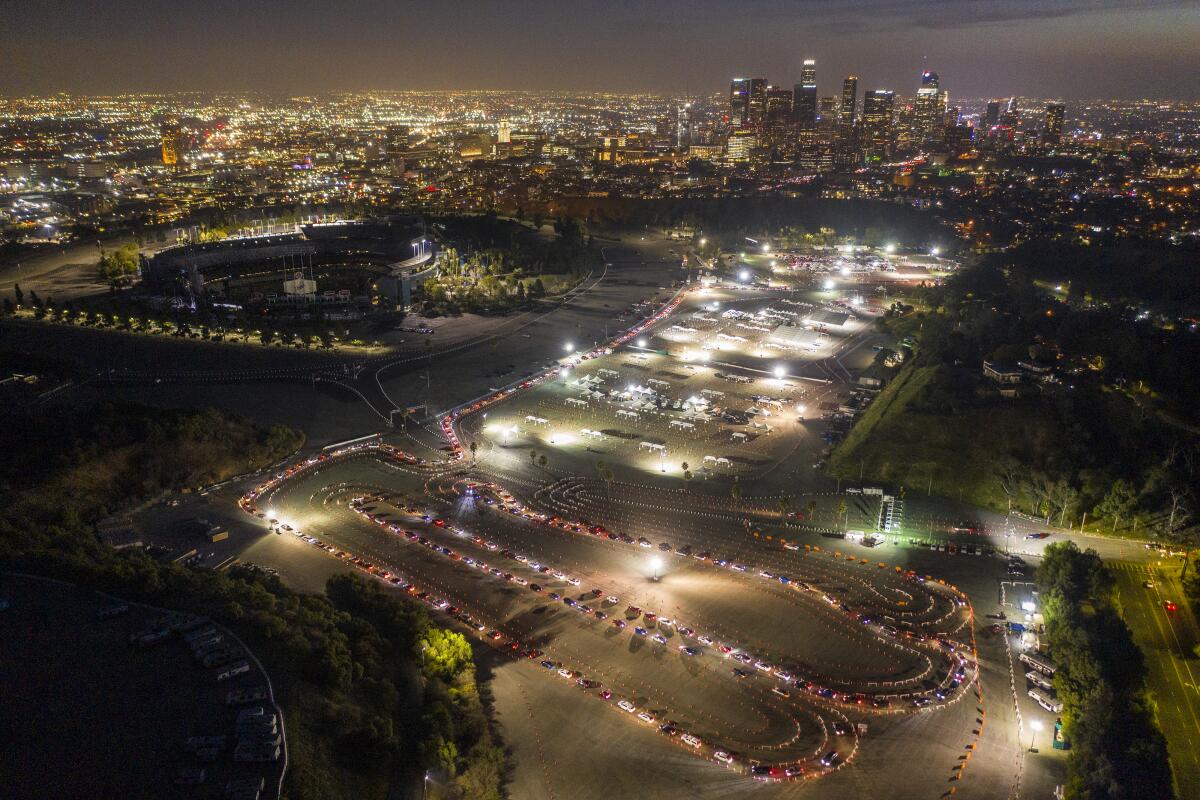
- Share via
Even as parts of California move to widen the pool of people who can get the COVID-19 vaccine, officials are continuing to preach patience as the demand for doses still far outstrips supply.
A sign of this challenging contrast emerged Wednesday when Los Angeles County announced that some teachers, food and agricultural workers, and first responders would begin receiving COVID-19 vaccinations in two to three weeks.
That brought cheers. But hours later, Los Angeles Mayor Eric Garcetti said a shortage of available vaccines would force officials to close five city-run vaccination sites for at least two days, scheduled to begin Friday. On Thursday, the sites ran out of doses earlier than expected and had to turn some people away.
Until significantly larger shipments of the two vaccines being used in the U.S. start rolling in consistently, officials say, it will still take time to finish vaccinating those who are eligible now, let alone the millions more Californians who have yet to get in line.
“With very limited vaccine supply and uncertainty in the timing for increased production, a realistic and carefully developed plan for expanding vaccination availability to these additional sectors is being developed,” L.A. County Public Health Director Barbara Ferrer said Wednesday.
With cannabis long deemed a medicine in California, workers at most marijuana shops are now eligible for COVID-19 vaccinations as healthcare workers.
Some officials are concerned about expanding vaccine eligibility until more seniors are inoculated.
Orange County, for instance, will continue to focus on residents 65 and older for the next two weeks, Dr. Clayton Chau, director of the Health Care Agency and health officer for the county, said Tuesday. Other groups already eligible for the vaccine in Orange County are healthcare workers, residents of long-term care facilities and law enforcement employees who work in areas with high infection rates, such as Anaheim and Santa Ana.
“Adding more people [to those eligible to get the vaccine] will give the seniors less opportunity to get vaccinated,” Chau told the county Board of Supervisors on Tuesday. “And I just want to remind folks that they are the most vulnerable population.”
Some Los Angeles County teachers, food workers and first responders could begin receiving COVID-19 vaccinations in two to three week.
What are the changes in L.A. County?
The details of how to expand vaccine eligibility to L.A. County teachers and workers are still being ironed out, but the move represents a significant expansion of the county’s vaccine rollout. To this point, only healthcare workers and those who live in long-term care facilities or are at least 65 years old have been able to book appointments.
With the majority of L.A. County’s seniors still waiting to receive their shots, officials warned it will take time to administer doses to large numbers of educators, child-care workers, food and agricultural employees, and emergency services and law enforcement workers.
More than 1.3 million Angelenos who work in those fields would be eligible to be vaccinated. They include about 668,000 teachers, child-care workers and other educators; at least 548,000 food and agriculture workers, which include grocery store employees; and about 155,000 workers in law enforcement, the courts and dispatch offices.
About 2.2 million L.A. County residents are already eligible, and the county still has significant work to clear that queue. Several large county-operated sites — including the Pomona Fairplex, the Forum in Inglewood, the L.A. County Office of Education in Downey, Cal State Northridge, Six Flags Magic Mountain in Valencia and the Balboa Sports Complex in Encino — are limited to second doses only for the remainder of the week.
“Anyone seeking a first dose at these locations will not get vaccinated,” the department said Thursday.
Of the roughly 4.4 million doses L.A. County would need to vaccinate all those who are already in line, the county has received only 1.28 million doses, 1.05 million of which had been administered as of last week.
Ferrer said about 80% of seniors have yet to receive a single dose, and both vaccines that are in use — from Pfizer-BioNTech and Moderna — require two shots, taken weeks apart.
What do future supplies look like?
L.A. County officials expect vaccine supplies to remain limited in the near future, at only about 200,000 doses a week. And as shipments have to be divvied up between first and second doses, there will be a natural cap on how many people will be able to start their vaccine regimen.
Officials, however, hope that the shortage will ease in the coming months — particularly with the expected arrival of the Johnson & Johnson single-dose vaccine, assuming it gets the OK from U.S. drug regulators. Two other potential vaccines are also on the horizon.
“So for now, it will take us time to reach everyone. And in these times of vaccine scarcity, we do need to ask that everyone be mindful of waiting for your turn,” Ferrer said.
Los Angeles County, by far the nation’s most populous, has seen its vaccine shipments seesaw wildly over the last month, making it difficult for officials to accurately peg the amount of supplies they’ll have. About 193,950 doses arrived the week of Jan. 11, but 168,575 were delivered the following week and only 137,725 arrived the week after that.
Most recently, the county received 184,625 doses — a number expected to climb this week to more than 218,000.
Officials throughout California have lamented the limited and variable vaccine shipments they’ve received, saying they have the capability to provide significantly more shots.
“Supply is the issue. That’s the constraint,” Gov. Gavin Newsom said this week. “So when you ask me, ‘What are we doing to vaccinate this group, that group, what about this group, what about that group?’ It’s an issue now of scarcity. It’s an issue of supply.”
The second shot of the COVID vaccine does not need to happen precisely 21 or 28 days after the first to be effective.
What’s happening at city-run vaccine centers?
Having exhausted its supply of first doses of the Moderna vaccine, Los Angeles will temporarily close its drive-through and walk-up vaccination centers, including the largest site at Dodger Stadium, Garcetti said Wednesday. The centers will remain closed at least through Saturday.
The mayor described the city’s vaccine supply as uneven and unpredictable: This week the city received 16,000 doses, only about 3,000 more than city officials have administered, on average, per day across the five inoculation sites. By comparison, the city secured 90,000 doses last week and 29,000 the week before, he said.
Anyone who has received a first Moderna dose will receive a second shot, Garcetti said. The city has administered 293,252 vaccines to date, using 98% of the doses it has received, he said.
The city will keep open mobile vaccination clinics that have been dispatched to areas of South Los Angeles where residents have been infected and killed by the virus at disproportionate rates, the mayor said.
Garcetti said he hopes to reopen the city-run drive-through centers Tuesday or Wednesday.
More to Read
Sign up for Essential California
The most important California stories and recommendations in your inbox every morning.
You may occasionally receive promotional content from the Los Angeles Times.
